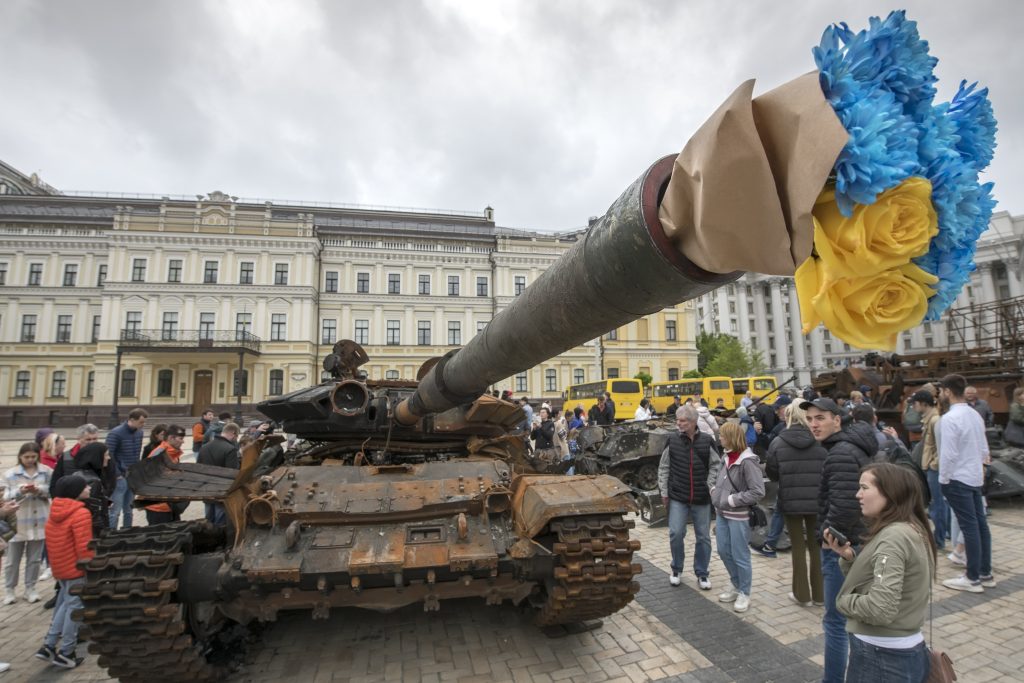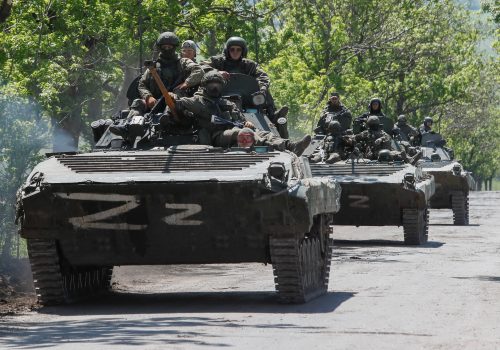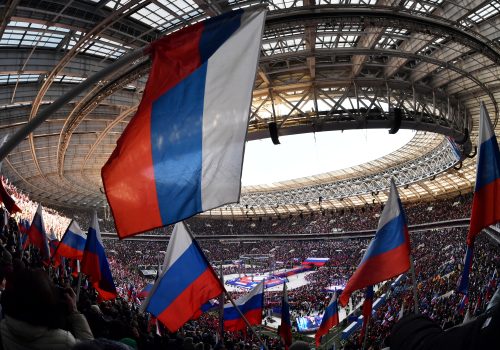With Russia’s invasion of Ukraine now in its fourth month and encountering serious military setbacks, there is a growing debate over what a potential Ukrainian victory might look like.
Some government officials in Kyiv have announced Ukraine’s aspiration to liberate all territories occupied by Russia, including Crimea. The Ukrainian army’s proven ability to defeat Russian forces on the battlefield and the accelerating delivery of heavy weapons from the West make this goal of complete liberation at least theoretically possible.
However, some Western leaders fear the consequences of a comprehensive Ukrainian victory and favor the idea of a compromise peace. Most notably, French President Emmanuel Macron has repeatedly warned against “humiliating” Vladimir Putin. Advocates of appeasement ignore the fact that any settlement which leaves Russia in possession of Ukrainian lands occupied since 2014 would weaken the international security order and effectively reward Russia for aggression, thereby setting the stage for further wars.
Talk of a Ukrainian victory is certainly optimistic but by no means implausible. Moscow has already suffered catastrophic losses during the first 100 days of the war, with British military intelligence in mid-May estimating that Russia had lost around one-third of its invasion force amid “consistently high levels of attrition.”
Ukraine’s battlefield success has so far been achieved largely with outdated Soviet arms and light defensive Western weapons. With more sophisticated heavy weapons now beginning to reach Ukraine in significant quantities, further Ukrainian victories seem possible.
There are a number of good reasons to pursue the complete liberation of Ukraine. On purely humanitarian grounds, the millions of Ukrainians living in occupied areas of the country deserve to be freed from Russian rule. Forcing Russian troops to retreat entirely from Ukraine would also be the best way to prevent another round of aggression in the years ahead.
Crucially, Ukraine’s liberation would be a victory for international law that would mark an end to relative impunity Putin has enjoyed since he first attacked Ukraine in 2014. This last point is fundamental if a lasting peace is to be established. But in order for international law to prevail, Russia must first be cured of its imperialistic instincts.
Stay updated
As the world watches the Russian invasion of Ukraine unfold, UkraineAlert delivers the best Atlantic Council expert insight and analysis on Ukraine twice a week directly to your inbox.
Discussion of a post-imperial Russia inevitably brings to mind the European experience with other fallen empires. The broadly accepted lesson of the post-WWI Treaty of Versailles is that a defeated foe should not be humiliated as this will cause revanchism, as occurred with the rise of the Nazis in post-war Germany. This appears to be a strong motivating factor behind President Macron’s calls for a compromise settlement in Ukraine, but such thinking is dangerously misguided.
As not a single Allied shell had fallen on German territory in WWI, this left room for the infamous “stab in the back” theory of a conspiracy behind the German defeat. Accordingly, Adolf Hitler and Joseph Goebbels were able to persuade their public to make a second try and correct an alleged historical injustice by launching another war.
There are obvious parallels here with the revisionist view regarding the collapse of the USSR. During his two decades in power, Putin has been remarkably successful in rehabilitating the Soviet past while blaming the collapse of the empire on Pentagon intrigue and the cloying egoism of Mikhail Gorbachev. As a result, many Russians are now convinced that the USSR was also a victim of a grave historical injustice and enthusiastically embrace efforts to reclaim territories lost in 1991.
Eurasia Center events

Post-Soviet Russia never underwent a period of de-imperialization that might have enabled the country to move beyond the imperial mindset that Soviet Russia had itself inherited from the Czarist era.
This contrasts with the post-WWII experience of Germany and Japan. Both countries experienced catastrophic defeat followed by periods of foreign occupation. It was this trauma that caused them to deeply reexamine their cultural values and turn away from centuries of militarism. The occupation powers in both Germany and Japan also oversaw a “re-education” of the two societies. This role as external change agents was necessary because neither society was likely to engage in re-education on their own.
There is no prospect that a Western coalition will occupy today’s Russia, of course. At the same time, a nation accustomed to a long imperial history and soaked in the revisionism of the Putin era is unlikely to find within itself the cultural and intellectual resources to rethink its most cherished national mythologies. It would take something as profoundly shocking as defeat in Ukraine to force Russians into a national reckoning on such a scale.
The collapse of the Soviet Union was a deeply traumatic event for all Russians, but it is now apparent that this trauma was not sufficient to cause a rejection of Russia’s imperial identity. Instead, Putin has skillfully revived imperial sentiments to generate popular support for his expansionist foreign policy.
The West has also played a significant role in this process, with Western leaders and commentators all-too-often embracing Russia’s post-Soviet victimization narrative while disregarding or downplaying the victimization of Russia’s neighbors. This has helped contribute to the mood of unrepentant imperialism in modern Russia that set the stage for the invasion of Ukraine.
In order to bring the prevailing cycle of Russian imperial aggression to an end, Putin’s invasion of Ukraine must result in unambiguous defeat. A Ukrainian victory would send shock waves through Russian society and force Russians to engage in a long overdue exploration of the country’s imperial identity. If defeat is painful enough, it could spark fundamental changes within Russia and lead to the kind of breakthrough that the false dawn of 1991 failed to achieve. Anything less will merely serve as a temporary pause before the next Russian invasion.
Dennis Soltys is a retired Canadian professor currently living in Kazakhstan.
Further reading
The views expressed in UkraineAlert are solely those of the authors and do not necessarily reflect the views of the Atlantic Council, its staff, or its supporters.

The Eurasia Center’s mission is to enhance transatlantic cooperation in promoting stability, democratic values and prosperity in Eurasia, from Eastern Europe and Turkey in the West to the Caucasus, Russia and Central Asia in the East.
Follow us on social media
and support our work
Image: A bouquet of blue and yellow flowers sticking out of the barrel of a destroyed Russian tank displayed for Ukrainians to see at Mykhailivska Square in downtown Kyiv, Ukraine, May 22, 2022 (Photo by Maxym Marusenko/NurPhoto)




